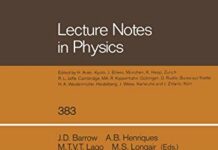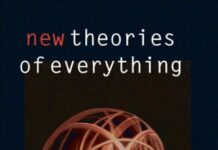
Ebook Info
- Published: 2014
- Number of pages: 172 pages
- Format: PDF
- File Size: 1.74 MB
- Authors: John D Barrow
Description
There is no more profound, enduring or fascinating question in all of science than that of how time, space, and matter began. Now John Barrow, who has been at the cutting edge of research in this area and has written extensively about it, guides us on a journey to the beginning of time, into a world of temperatures and densities so high that we cannot recreate them in a laboratory. With new insights, Barrow draws us into the latest speculative theories about the nature of time and the “inflationary universe,” explains “wormholes,” showing how they bear upon the fact of our own existence, and considers whether there was a “singularity” at the inception of the universe. Here is a treatment so up-to-date and intellectually rich, dealing with ideas and speculation at the farthest frontier of science, that neither novice nor expert will want to miss what Barrow has to say. The Origin of the Universe is “In the Beginning” for beginners — the latest information from a first-rate scientist and science writer.
User’s Reviews
Reviews from Amazon users which were colected at the time this book was published on the website:
⭐This book is interesting, as are all Barrow’s books, but outdated, it was originally published in 1994. For instance, the COBE satellite which he writes about a lot has been superceded. The e-book version is also badly proofread. For instance the header of chapter 3 reads: THE SIHGULARITY AHD OTHER PROBLEMS.
⭐Interesting and easy to read.
⭐This book does not explain the origin of the universe; it doesn’t claim to. Science in the person of Professor John Barrow follows the deductive-inductive mantra; either a lab experiment replicates the physical result of specfied causes or flawless reasoning shows there is no room for doubt. Both approaches collapse. If science loses, does God win?GOD’S NANOSECONDMax Planck showed God could not have created the universe. First there was nothing and in a billionth of a second – the big bang – there was everything and everything that will be. Forget “seven days” and lab experiments. Science does not make something from nothing.ZENO – DEDUCTION IS FUTILEA man walks each day half the remaining distance to his destination; he will never arrive. Infinity doesn’t end; there is no ultimate particlde so we cannot find the building block of the universe.DESCARTES – THE COSMOS IS ONLY IMAGINATIONThe real world is only what your senses encounter; it’s just a dream – a mental trick. Descartes failed to break out of the “egocentric predicament.”NEWTON – FORCES IN BALANCEAn apple fell to earth and observer Newton “explained” the mutual attraction. He assumed attraction is an attribute of “mass.” Masses will orbit. Later Einstein and Planck described described gavity as mysterious “energy” which comes in discrete “quanta.” A quantum is “the energy of an atom at rest;” let it go at that. However Newton seriously underestimated the number of objects that whizz about in balanced orbits. National Geographic put the number at a “gazillion.” That’s very hard math.EINSTEIN’S SPEEDEinstein persuaded his peers that the speed of light is both the minimum velocity of energy and the maximum. Mental scanning certainly exceeds the speed of light. One problem is the “curvature” of space; algebra is irrational but space insists on transcendental parameters – pi, “e” and sines, for example. These do not exist in nature.EVOLUTIONOur senses all evolved and are incomplete; so science is literally groping in the dark. Cats hear better, eagles see better and dogs apparently take the prize for ESP. Human brains compute distance from data received by two eyes or two ears; the brain is a sense organ, but pretty primitive. Science concedes that birds evolved from dinosaurs. The proof is in the feet and the eggs. Feathers and chirping just came along; Darwin missed the whole chapter. Forget the universe; explain hummingbirds!
⭐Astrophysics is never easy. Expect to have to read and reread many parts a number of parts, and then one’s understanding of the origin of the universe will never be complete.Fine introduction and reference book for those who are curious and willing to commit the required effort.I recommend this book as one of the most accessible readable and enjoyable Physics primers for students of all ages.
⭐Excellent presentation of the latest theories about the origin of the universe, like the ‘no boundary condition’ (Hawking and Hartle), the quantum origin, the inflation period (Guth) or superstrings.This book is more a scientific explanation with charts and dwawings, but – not always easy – understandable for the layman.I missed the speculation of a John Gribbin or a Martin Rees.As in his other excellent book ‘Theories of Everything’, the author believes that “One day we may be able to say something about the origin of our own cosmic neighbourhood. But we can never know the origins of the universe. The deepest secrets are the ones that keep themselves.”
⭐For anyone that enjoyed A Brief History of Time this is a excellent follow up. Great explanation of inflation and the possibilty of a non-singularity beginning of the universe.
⭐This book, by John Barrow, seeks to outline and explain the key theoretical understandings that dominated scientific knowledge in the mid-1990’s regarding the origin of the universe. Barrow is concerned with how the cosmos began – i.e. what happened during the so-called ‘big bang’. This is a well-written book, presuming no scientific background on the part of the reader. It’s also a very short book, and makes no effort to be thorough or comprehensive. Rather, it’s intended to offer a guide through the various theories that were discussed within the academic community of physicists and astronomers.Barrow presents the ideas, concepts and evidence for the ‘big bang’. He then seeks to speculate on what occurred during the initial minutes of the universe … even down to the first few seconds. It’s then, at the very instance of universal beginning, that known science ceases to be able to present solid arguments as to what’s going on. Cause and effect break down, as the cosmos exists as a quantum realm.This remains a relevant book – and I’m sure it will be of interest to anyone studying cosmology and astronomy at college and as an undergraduate at university. I also recommend it to more general readers, who might be fascinated by the sort of issues raised through exploring the origin of the universe.
Keywords
Free Download The Origin Of The Universe: Science Masters Series in PDF format
The Origin Of The Universe: Science Masters Series PDF Free Download
Download The Origin Of The Universe: Science Masters Series 2014 PDF Free
The Origin Of The Universe: Science Masters Series 2014 PDF Free Download
Download The Origin Of The Universe: Science Masters Series PDF
Free Download Ebook The Origin Of The Universe: Science Masters Series



